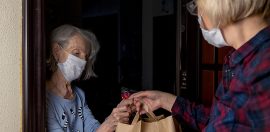Volunteers are critical to bushfire recovery, but it takes coordination

4 November 2020 at 6:12 pm
A new report says if volunteers are not sufficiently prepared and trained in disaster situations, they may hamper recovery efforts.
Volunteers were critical to recovery efforts during the summer bushfire season, but there needs to be greater support and better coordination of volunteers in the event of future natural disasters, the bushfire royal commission says.
The latest Royal Commission into Natural Disaster Arrangements report found that without a coordinated approach to manage volunteers, bushfire affected communities struggled to respond to the influx of individuals and community groups eager to help out.
The report pointed to examples of church groups arriving in communities to help “clean up things”, without any volunteer management practices in place, knowledge of contamination risks, understanding of what communities actually wanted, or guidance or support.
Volunteers also need to be adequately prepared before disaster strikes, with the report noting room for improvement in this area.
“If not sufficiently prepared and trained, volunteers may hamper recovery efforts,” the report said.
One of the key volunteer recommendations of the report is regular and ongoing national forums for charities, non-government organisations and volunteer groups to improve coordination of recovery support.
Mark Pearce, the CEO of Volunteering Australia, told Pro Bono News he welcomed the recommendation, and said a national coordination committee for volunteers would be a critical first step to prepare for future disasters.
“People put up their hand to volunteer, but it’s a matter of coordinating them so that there are, in fact, places for them to go and that desire to contribute one’s time can actually translate into action,” Pearce said.
Volunteers are willing, but must be supported
The report also said that a lack of compensation for volunteers across all states and territories affected the ability to deploy volunteers quickly in emergency scenarios.
While some state and territory governments cover the operational costs of volunteers – for example, NSW provides limited funding towards establishing volunteer base camps – it’s not consistent across the country.
Pearce said the report highlighted the immediate need for additional investment in volunteering so that the recommendations of the report could be carried out.
“Volunteering was critically important in terms of the fighting of the bushfires, but also in terms of the community support and the recovery mechanisms that sat around that,” he said.
“So this is actually making sure that at a community level, but certainly at a local, state and federal government level, there is an increased resourcing and recognition of volunteering.”
He added that it was critical organisations like Volunteering Australia were given a seat at the table when planning took place.
“This will mean that volunteering is at the table when planning is done rather than being a function which is invited in afterwards to address the problem,” he said.









I can’t see a link to the report….